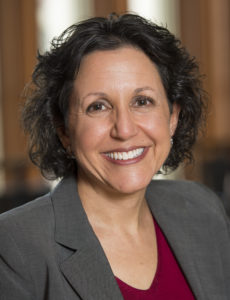
Stephanie Kurtzman has been named the Peter Sortino Director of the Gephardt Institute for Civic and Community Engagement at Washington University in St. Louis.
Kurtzman, a 19-year veteran of Washington University, had served as interim executive director since April 2016, when founding director Amanda Moore McBride departed to lead the Graduate School of Social Work at the University of Denver.
“Thanks to Stephanie’s leadership, vision and commitment, the Gephardt Institute has introduced new student-focused programs and initiatives, strengthened the university’s relationship to the St. Louis community and expanded community-engaged teaching and scholarship,” Provost Holden Thorp said. “We conducted an extensive, nationwide search and agreed the best person was, in fact, already at Washington University.”
The position is supported through an endowment established in honor of civic leader Peter Sortino, who died in March. Sortino most recently served as assistant vice chancellor at Washington University and previously led the Danforth Foundation. During his long career, he worked to renovate Forest Park, redevelop Washington Avenue, establish the bistate parks and trails system and reimagine the grounds of the Gateway Arch.
Chancellor Mark S. Wrighton said Kurtzman embodies the values that defined Sortino’s career.
“Peter Sortino was a great contributor to the political and civic life of the St. Louis community for many years, as well as a trusted colleague and adviser here at Washington University,” Wrighton said. “I can’t think of a more fitting tribute than naming the directorship of the Gephardt Institute in his honor. Peter was known across the region for his effectiveness in getting things done, and we all have the same kind of expectations for Stephanie Kurtzman and the mission of the Gephardt Institute.”
Kurtzman said she is honored to lead the Gephardt Institute and wants to build upon its many successes. In recent years, Kurtzman launched Meet St. Louis, which introduces first-year students to the issues, neighborhoods and leaders of the St. Louis region; the St. Louis Urban Fellows Program, which provides post-graduate fellowships in local government; WashU Engage, which brings together alumni across the country to serve their home communities; and WashU Votes, which organizes voter registration and educational forums on public policy issues.
Kurtzman’s team also has worked with faculty to expand community-engaged courses. Currently, Washington University hosts over 80 courses that bridge coursework with community voices and real-world challenges — a number Kurtzman is committed to increasing.
“The Gephardt Institute offers robust student civic engagement experiences at the co-curricular level,” Kurtzman said. “We want to foster the same level of robust opportunities in the academic sphere, for both undergraduate and graduate students. We look forward to deepening our work with faculty who are interested in bringing community engagement into their courses by expanding our range of resources, training and support services.”
The goal, Kurtzman said, is both to develop engaged citizens and to build strong communities.
“We are part of a movement that is advancing the civic mission of higher education,” Kurtzman said. “It is important to examine how we align the resources, energy, knowledge and talent within the university in partnership with the community. That is different than imposing ourselves and the university’s agenda. We want to listen to the needs of the community, build lasting partnerships and find those win-wins for student learning and positive community impact.”